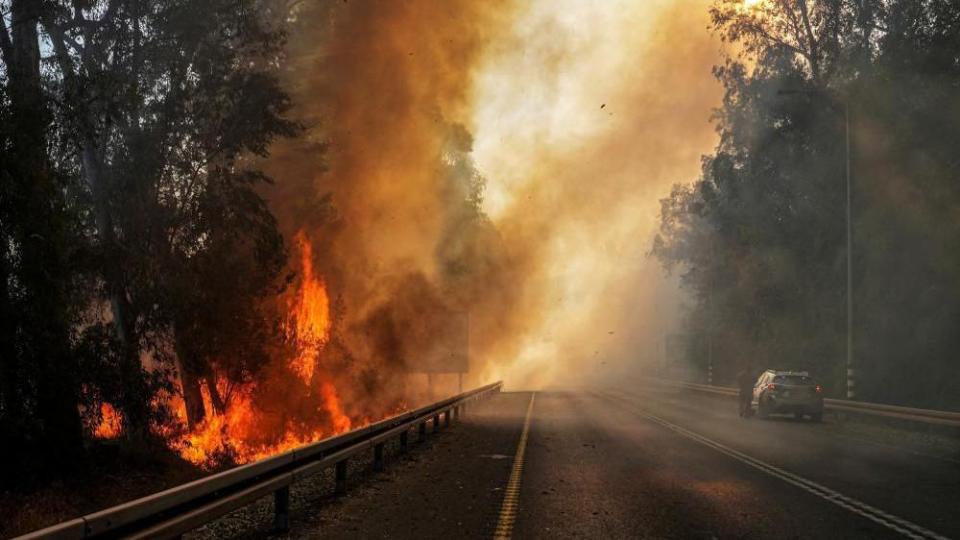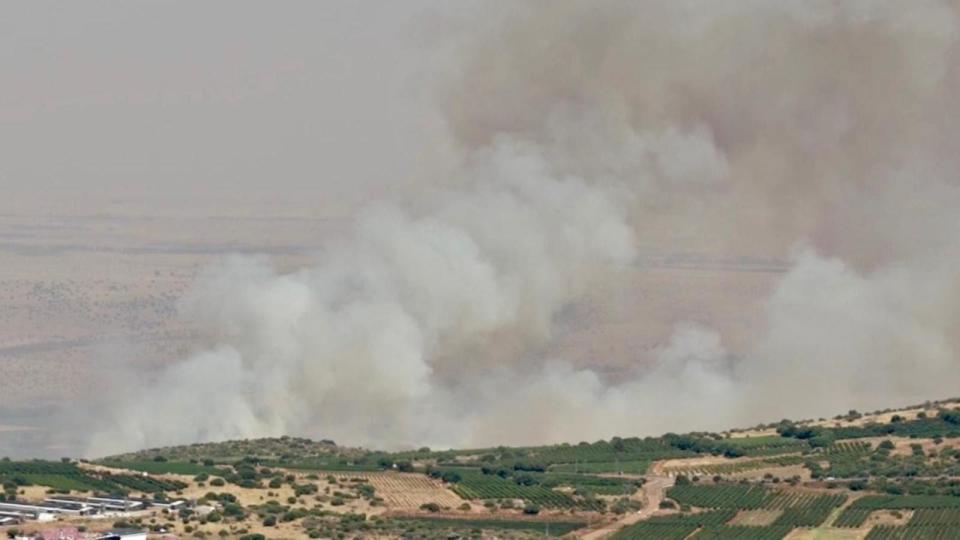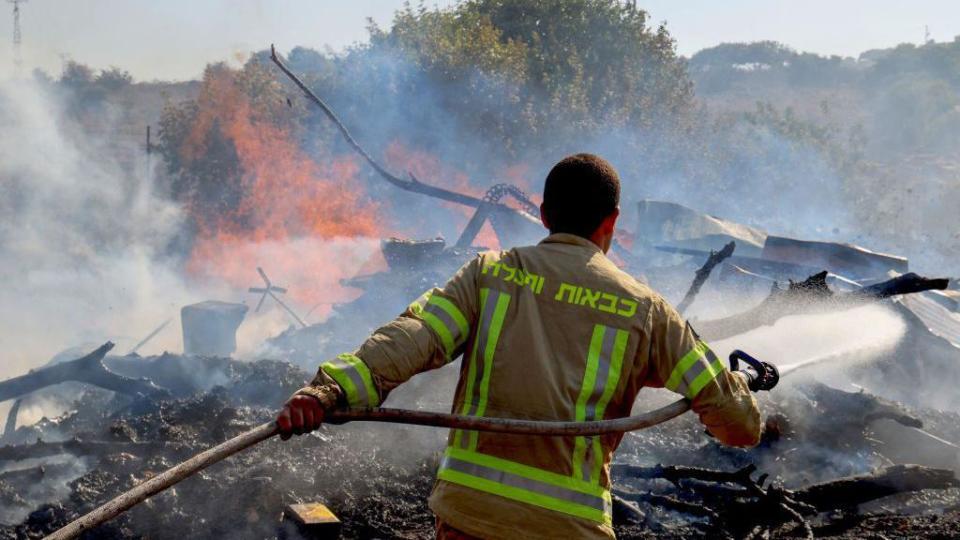Three rusty water tankers are parked on the edge of Kibbutz Malkiya, on Israel’s border with Lebanon; little bigger than a family car, they look like something out of an old cartoon.
A collection of industrial leaf blowers is stacked nearby.
“That’s all we have,” explains resident Dean Sweetland. “We only have these – and the leaf blowers – to blow the fire back into the dead areas.”
Dean, a Londoner who moved to the kibbutz eight years ago, is one of a dozen residents left to fight recent bushfires in the area, sparked by Hezbollah rockets from Lebanon.
“We’re on our own,” he says. “The flames could be six meters high. Sometimes you just can’t get close.”
He points to leaf blowers exposed to the sun.
“And we’re combating that with gardening tools.”

In recent days, images of the fires have made headlines in Israel.
The fires, sparked when Hezbollah rockets hit dry undergrowth in high summer temperatures, have burned 3,500 acres, according to forest managers.
Monday was “a day of battle,” said Israel Fire and Rescue Commissioner Eyal Caspi, with 94 fires burning in these northern hills.
Most are already out of the question or under control, but rockets fly over homes here several times a day and each one has the potential to spark a new fire.
And there are places right now where firefighters don’t go.
“There is a war here and in a war zone, the operations are different,” Caspi told Israel’s Kan News radio station.
“In certain areas, where there is no immediate danger to human life… where the army knows that firefighters could be injured, they instruct us not to enter. And I support that.


From the back terrace of his house – built from shipping containers, a few hundred meters from the border with Lebanon – Dean Sweetland points out the clouds of gray smoke rising from the nearby hills, to the sound of bombs and distant fighter planes.
Most of the other residents of Kibbutz Malkiya were evacuated in the days following Hamas’ October 7 attacks on Israel, when its Hezbollah allies in Lebanon began shooting at communities here. Both armed groups are labeled terrorist organizations by Israel, the US and others.
But Dean, who served in the British army, remained. He is part of a group of residents of border communities rushing to put out fires that firefighters are unable to access.
The Israeli army, he says, is not a solution.
“Especially when we are in Hezbollah’s line of sight, they will see the soldiers and send a rocket,” he says. “We hear the drones when we put out the fires.”


In the early days of the war, Dean says, tanks were stationed around the kibbutz and drew a lot of fire from Hezbollah.
They have already left, and between the bombings, the kibbutz is at peace. But Dean and his neighbors feel the emptiness. Families evacuated eight months ago still live in temporary accommodation further south.
The fires here are a vivid reminder that the Israeli government’s promise to protect these northern areas and bring residents home has not yet been fulfilled.
“We feel like we are forgotten people,” says Dean. “They don’t care about the north.”
The attitude of many in the country, he says, is to “let it burn”.
“I think we have to eliminate Hezbollah within a distance of 10 km, maybe more,” says Yariv Rozenberg, deputy commander of the Kibbutz Malkiya civil defense team.
“You can’t kill them all and they won’t get out of here. But we need more army here and we need to get back to our lives – to get our families back.”
As the months pass, pressure increases on the Israeli government to resolve this conflict and bring people home.
Israel’s far-right security minister this week called for Israel to burn “all Hezbollah strongholds: destruction, war!”
Others were more measured. A war with Hezbollah would be a much more difficult and dangerous conflict than the one Israel is waging in Gaza.
Hezbollah’s deputy chief, Sheikh Naim Qassem, told Al Jazeera television station that the group was not seeking to expand the conflict, but that any Israeli expansion of the war would be met “with devastation.”


Before a war cabinet meeting to discuss the situation on Tuesday night, the Israeli military chief of staff, Lieutenant General Herzi Halevi, said the country was “approaching the point where a decision will have to be taken.”
The armed forces, he said, were “prepared and ready to go on the offensive.”
Prime Minister Benjamin Netanyahu, visiting troops and firefighters in the northern city of Kiryat Shmona on Wednesday, said the government was prepared for “very strong action in the north.”
“One way or another, we will restore security in the north,” he said.
Many believe that a ceasefire in Gaza would help calm the situation further north.
“Gaza is the key,” says Dean. “This needs to be resolved, one way or another. Then Hezbollah will stop, because they are doing this in support of Hamas.”
The conflict in the North is closely linked to the war in Gaza.
Over the past eight months, focusing on Gaza, Israel’s leader has tried to keep this conflict contained.
Now he faces a glaring reminder of this other front: caught between the war that hasn’t ended in the South and the war that it doesn’t necessarily want to start.
































